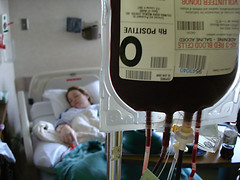 We all have our hobby horses, and one I've ridden until it's gotten a bit arthritic is the role of religion in genre fiction. Or, rather, the lack of a role. SF legend Orson Scott Card once noted that the situation "is exactly parallel to the way sex was dealt with in most fiction prior to the 1950s. It goes on all around us, but you'd never know it from the fiction." When it isn't ignored, faith often gets treated as a lamentable aberration or heralded with a ham-handed sincerity more heartfelt than readable. But a few have handled it with both sensitivity and subtlety, including Dorothy Sayers, Lars Walker, J.R.R. Tolkien and Card himself. Another to add to that list is fantasy author Deborah J. Ross who penned the post-apocalyptic short story "Transfusion."
We all have our hobby horses, and one I've ridden until it's gotten a bit arthritic is the role of religion in genre fiction. Or, rather, the lack of a role. SF legend Orson Scott Card once noted that the situation "is exactly parallel to the way sex was dealt with in most fiction prior to the 1950s. It goes on all around us, but you'd never know it from the fiction." When it isn't ignored, faith often gets treated as a lamentable aberration or heralded with a ham-handed sincerity more heartfelt than readable. But a few have handled it with both sensitivity and subtlety, including Dorothy Sayers, Lars Walker, J.R.R. Tolkien and Card himself. Another to add to that list is fantasy author Deborah J. Ross who penned the post-apocalyptic short story "Transfusion."For three centuries, Victor has skulked in the shadows, surviving on the blood of the weak and earning the nightmarish reputation his kind had always been given. But a greater darkness has encroached upon the world, a midnight of ineradicable illness and nuclear terrorism. When a detonation weakens the fault lines running through Los Angeles, Victor ends up buried beneath tons of rubble and nearly succumbs to hunger while clawing his way out. Only quick action from an itinerant doctor named Jacob saves him. Mistaking Victor's pallor for anemia, Jacob gives him an emergency transfusion, inadvertently binding the two together even as civilization itself falls apart.
Religion (when it turns up at all) can feel incidental to a narrative's action, an offshoot rather than an anchoring root. Not so in "Transfusion." Jacob is an observant Jew, and his belief powers the story's plot, particularly his trust in Maimonides' famous quote about the scales of good and evil. One would think such an emphasis could alienate those not of the faith. It doesn't, at least not for me. Ross (writing here as Deborah Wheeler) deftly relates Jacob's Judaism to universal experiences such as the hunger for hope amongst chaos and the numinous beauty of the natural world. There's a bit of bittersweet humor, too. In one scene, a community of Christian farmers asks Jacob to say grace. He begins, but having lost his prayer book, peters out partway through:
"Blessed be Thou, Lord our God, Master of the Universe, who brings forth bread from the earth ..."With a generous spirit and a delicate touch, "Transfusion" plots it just right. Its lines truly fall in pleasant places.
More, there should be more. His thoughts blurred. Phrases in Hebrew came to him and blew away again, like dead leaves.
Stillness hung over the table. Jacob's eyes focused on the bowed heads. A wave of emotion -- tenderness and awe and something he could not put a name to -- swept through him. Tears rose to his eyes; his heart fluttered like a caged bird.
From the other end of the table, someone murmured, "In Jesus's name, Amen." A moment later, they were laughing and handing round the platters of food.
(Picture: CC 2008 by makelessnoise)


No comments:
Post a Comment